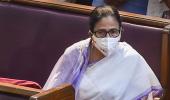33-year-old Abhishek Banerjee has emerged as the most visible and significant leader in the party after his pishi (aunt), Mamata Banerjee reports Ishita Ayan Dutt.

Bengal politics came full circle on June 12 when Mukul Roy, a founding member of the Trinamool Congress, returned to the party after a near four-year stint with the Bharatiya Janata Party.
This came days after Abhishek Banerjee visited Roy's ailing wife at the hospital.
Roy rejoined the party with his son, Subhranshu.
More leaders keen on coming back to the Trinamool fold are said to be in touch with Abhishek and the days ahead could see him playing an even more important role.
But the rise of Abhishek Banerjee aka Bhaipo in the ranks of the party and Bengal politics was a foregone conclusion after the election in West Bengal (he was AITC youth president for seven years before the recent elevation).
From playing a crucial role in getting poll strategist Prashant Kishor on board after the rude jolt delivered by the Lok Sabha election in 2019 -- that marked a meteoric rise of the BJP in Bengal -- to crisscrossing the state as star campaigner, the 33-year-old politician emerged as the most visible and significant leader in the party after his pishi (aunt), Mamata Banerjee, this assembly election.
But lest anyone leaps to conclusions that the poll bounty -- the TMC bagged 213 seats of 292 polled -- would land him a plum post in the government, Abhishek has made it clear he would not take up any ministerial post for two decades.
He has always battled charges of being a product of dynastic politics. And though he played a key role in the landslide victory, Mamata has been careful not to project him as heir apparent.
The man himself also doggedly plays down such suggestions.
At a press conference after he was appointed general secretary, Abhishek said that there is no second man in the Trinamool Congress after Mamata; everybody after her is a party worker.
Abhishek's rise has been in the making for a while, though.
He fought and won from Diamond Harbour parliamentary seat in 2014 and campaigned in the assembly election in 2016 with fervour.
After the emphatic victory of the party in 2016 -- bagging 211 seats -- it was widely believed that a bigger role would be offered. That did not happen.
He was conspicuously absent from the oath-taking ceremony on Red Road in the heart of Kolkata with scores of regional, central leaders in attendance.
Yet, his elevation this time around was beyond question.
The MBA was not just instrumental in roping-in Kishor, but was the interface between the party and I-PAC.
The party dropped many sitting MLAs and switched seats, based on extensive one-and-a-half year research done by Kishor and his team.
In fact, many who switched sides ahead of the elections were irked as much by Kishor's involvement as by Abhishek’s growing stature in the party.
In an interview with a television channel during the election, Abhishek suggested that Kishor's team had provided information to the party that helped separate potential defectors from loyalists who were credible and had true potential.
Those who criticised Abhishek -- overtly and covertly -- stand silenced after the poll outcome.
Not only did the Trinamool land an overwhelming victory, but in South 24 Parganas -- considered to be his turf -- the party won 29 of 31 seats; in Jhargram, where he was put in charge, the BJP, after making inroads in the Lok Sabha, drew a blank.
A senior Trinamool leader said Abhishek focused on a straightforward campaign and strategised at the back-end with Kishor's team, while the BJP made him the target of personal attacks.
"It backfired," he said.
A BJP leader conceded that perhaps it would have been better for the party to focus on the development agenda and industry.
"The moment you tread on a personal level, it tends to give the opponent mileage and Abhishek became a hero," he said.
Bhaipo (nephew) entered the political lexicon of Bengal this election.
From 'tolabaaj Bhaipo' to 'Bhaipo window' -- Abhishek faced a barrage of barbs and taunts from the BJP central leadership; relatives were questioned by central investigative agencies in connection with an alleged coal scam.
But he took the allegations head-on and said at one of his public meetings that if charges against him proved to be true then he would voluntarily walk to the gallows and hang himself.
Abhishek is now working on a bigger plan to take the party national.
"It's not something new for the Trinamool. But alliances in the past have failed and the plans met with little success," pointed out a political commentator.
But Abhishek believes he can do things differently this time. He will be coming out with a concrete plan within a month about reaching out to other states.
Meanwhile, on home ground, he appears to be busy continuing with an outreach exercise even after the election.
Visiting grieving families affected by lightning strikes, seeking blessings of party veterans after his elevation and playing a pivotal role in taking back those who had crossed over to the BJP because they once felt elbowed out by him appear to be primary among them.












 © 2025
© 2025